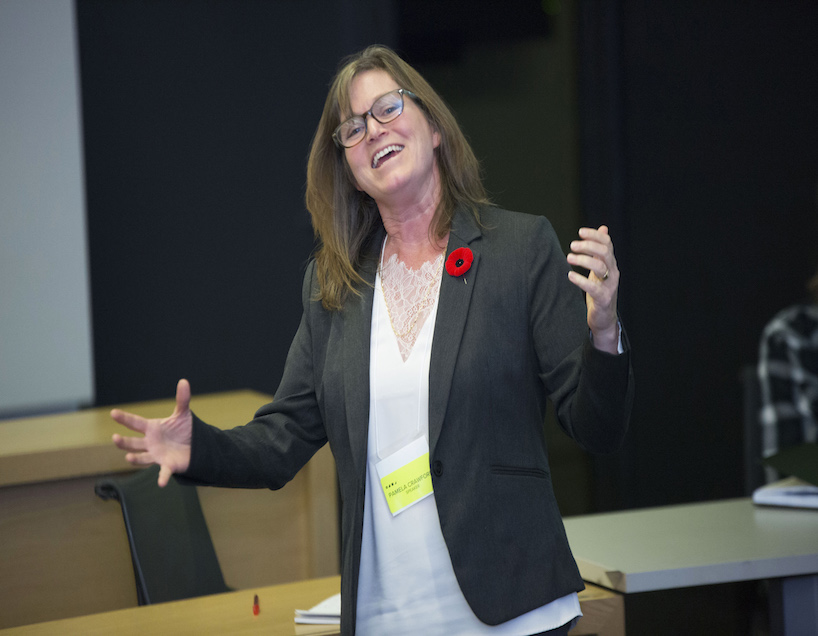Notes from our Making Connections Conference 2017
Getting away from A’s:
New approaches to student assessment and report cards
Speakers:Iram Khan and Shelley Brett: school principals from Surrey BC Pamela Crawford: Special Education Resource Teacher, Trillium Lakelands Board Elizabeth Bristoll: Grade 7/8 teacher, Toronto DSB Moderator: David Cameron, Research Director, People for Education |
Overview:As Ontario begins to explore broader goals for education beyond success in the 3Rs, we also have to think about how students’ growth in areas such as creativity, citizenship, and social-emotional learning are assessed and reported. British Columbia has moved to open up the reporting process and, in some cases, kids aren’t getting marks at all. Some teachers in Ontario are also experimenting with a ‘no-grades’ approach to teaching and learning. Learn more about how students are being assessed in these classrooms, and what it means for parents, students, and teachers. |
Presentations
Click the panelists names to see notes from their presentations
- New system of assessment introduced in British Columbia
- Moving away from focusing on specific curriculum CONTENT that is mastered every year
- Letter grades do not promote learning – may actually prohibit it
- Moving from ‘reporting’ to ‘communicating student learning’
- Fresh Grade grading system helps educators move grading to an online platform which is more focused on reflection or conversation, rather than just a letter grade
Fresh Grade is:
- Online, ongoing digital reporting
- Ability to include a variety of evidence of learning including pictures, videos, audio, text….
- Student self-reflection is a key part of it
- Parents can have input online and through formal conferences and informal meetings with teachers
- Focus on learning process on a continuum (no letter grades)
- Student input and goal setting (What did you learn? What do you still need to work on? What do you need to do next to improve on?)
- The most presence we are seeing on Fresh Grade is by students
- Parent input – parents play a vital role – we give parent reflection prompts as well
- It is compatible with Google translate for parents that speak another language, they can translate and then upload their response to student work or teacher feedback
- The communication amongst all parties is apparent and more enjoyable
- Communication is ongoing and key
- The grades do not matter anymore, the questions about grades stop because it is all transparent for all parties (teacher, students and parents)
- Using a proficiency scale instead
- In Surrey, moving Kindergarten to Grade 9 to this system – Gr. 10 -12, more of a challenge because need grades for university
- Universities in BC are starting to experiment with entrance requirements that are not focused exclusively on grades
- Middle school teacher in inner city school in Toronto
- Passionate about challenging status quo to get students more passionate about learning
- 2 years ago, decided to experiment with student grades based on student and teacher feedback – could see that students were very engaged and learning – she decided to only give feedback, not grades
- Students had felt the pressure to get good grades, but their attitude started to change
- Students that had C or lower improved the most – willing to take more risks
- Students with higher achievement also took more risks, were happier
- She could see students’ strengths more clearly – when it came to writing report cards, she felt the grade given was more holistic as a result
- Didn’t tell anyone that she wasn’t giving marks – wanted to see if they noticed – only one student asked about her grade after an assignment
- Parents stopped asking about grades and were happy reading students’ reflections and feedback; parents seemed more satisfied in parent-teacher interviews
- At the end of the year, students appreciated the approach – more honest feedback, took it more seriously; they found it more motivating to get feedback on how to improve, rather than just a mark
- Feedback was positive from students, parents, and admin
- Special education resource teacher, looking at measuring ‘soft skills’ like self-regulation
- How do I communicate self-regulation to students?
- Used the competencies from Measuring What Matters as a framework to help understand what social emotional learning looks like
- Decided to use a sliding scale without numbers – can a dot on a line help me connect with the students I am working with?
- Developed a program where students get to choose what station they want to go to, based on what they felt they needed in terms of self-regulation (e.g. a student may choose yoga because he is feeling tense) and then place a dot on a scale (line) to determine their learning for that day
- She found that students took initiative to improve their own learning, were able to identify their own needs and also identify appropriate solutions
Panel Discussion
Challenges & Strategies:
- People saying “this [letter grades] is how we’ve done it all along. How do you know it will work?” – need to keep coaching them, constantly meet with them, more work
- The grading system actually created a barrier in teacher relationship with students, this approach breaks down that barrier, more communication, challenge is to figure out what they need most and move forward with that
- Important to model/demonstrate how to engage in growth mindset for students
- It is more challenging and time consuming to use these types of assessment
Successes & Examples:
- By not using grades, we create a safe learning environment – we want innovators; this approach allows students to fail and bounce back
- Motivation increases, students are better at setting goals
- the student/parent feedback helps to make assessment more meaningful
- get to know students much better
- We are not limited to reporting 3 times a year – everything is online and ongoing; We are getting everyone’s voices seen in there
- This allows us to focus on specific competencies and providing feedback on them
- It is all about community of learning and collaboration
Summation:
- Grading can be demoralizing and does not give students an opportunity to reflect on their own growth mindset
- Getting rid of grades helps to build community and communication amongst all students, educators, and parents
- This allows for students to take initiative in their own learning and demonstrate their critical thinking skills



